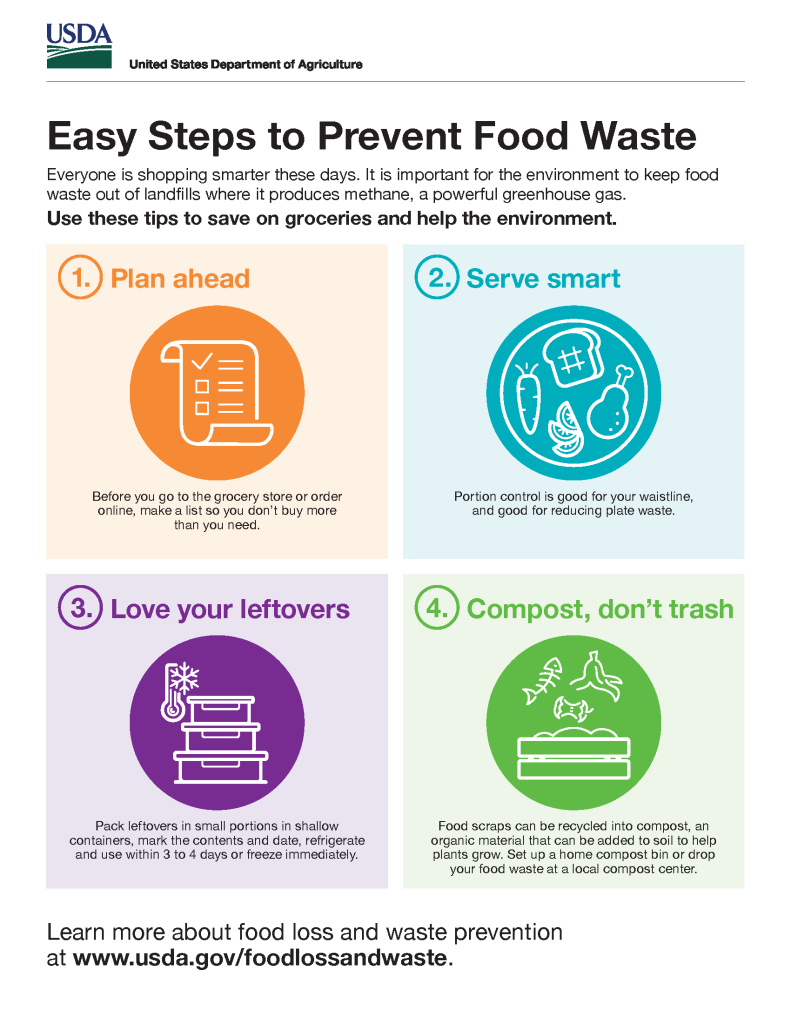In this article, you will discover practical and easy-to-implement tips on reducing food waste in your kitchen. We all know that throwing away edible food not only leads to a waste of resources but also contributes to environmental harm. By adopting these top ways, you will not only save money but also contribute to a more sustainable future. From properly storing leftovers to creatively using kitchen scraps, these strategies will help you make the most of your ingredients and minimize waste in your daily cooking routine. So let’s get started and make a positive impact in our own kitchens!
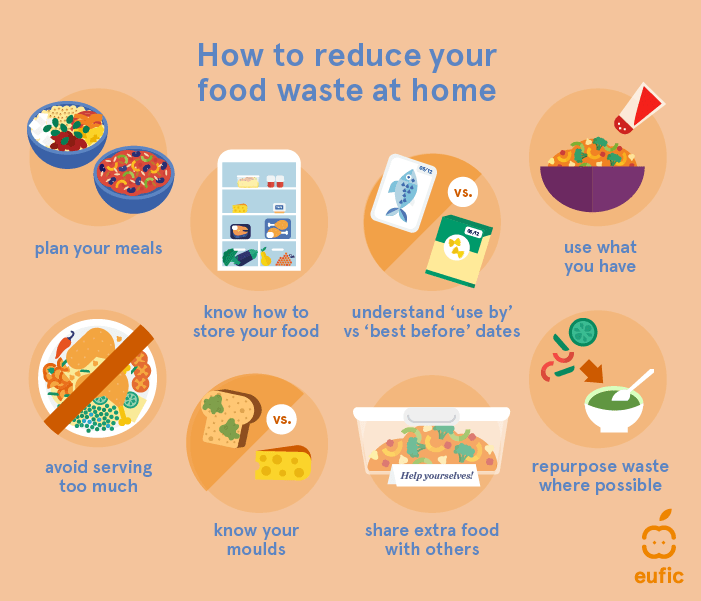
Proper Meal Planning
Create a Weekly Menu
To reduce food waste in your kitchen, one of the best strategies is to create a weekly menu. Sit down at the beginning of each week and plan out your meals for the upcoming days. This will help you figure out exactly what ingredients you need and avoid buying unnecessary items.
Make a Shopping List
Once you have your weekly menu planned out, make a shopping list of all the items you need. Be sure to be thorough and specific in your list, so you don’t forget anything. By sticking to your list, you can avoid impulse buying and prevent food from going to waste.
Stick to the List
When you go grocery shopping, it’s important to stick to your list. Avoid the temptation to add extra items that are not part of your meal plan. By sticking to your list, you’ll purchase only what you need, reducing the risk of food waste.
Use Leftovers for Future Meals
If you find yourself with leftover food from your meals, don’t let it go to waste. Get creative and find ways to incorporate those leftovers into future meals. For example, leftover roasted chicken can be used in a stir-fry or turned into a delicious sandwich. By using leftovers, you minimize waste and stretch your ingredients further.
Optimize Food Storage
Organize Your Fridge
Proper organization of your fridge is essential for reducing food waste. Keep similar items together, such as dairy products or condiments, to make them easily accessible. Clear out any expired or spoiled food regularly to make room for fresh ingredients.
Label and Date Items
To avoid confusion and prevent food from spoiling, it’s important to label and date your food items. This practice allows you to easily identify how long an item has been in the fridge and ensures that you use it before it goes bad.
Rotate Food Items
When you unpack groceries or prepare meals, make a habit of rotating your food items. Place newer items at the back of the fridge or cupboard and move older items to the front. This way, you’ll be more likely to use items before they expire.
Properly Store Fruits and Vegetables
Different fruits and vegetables have varying storage requirements. Some produce, like tomatoes and bananas, ripen quickly and should be kept at room temperature. Others, like leafy greens and berries, should be stored in the fridge to extend their freshness. Understanding the optimal storage conditions for each type of produce will help prevent spoilage.
Store Dry Foods Correctly
Dry foods, such as grains, pasta, and beans, can also go bad if not stored properly. Keep them in airtight containers to prevent moisture and pests from spoiling them. Store them in a cool, dry place away from direct sunlight to maintain freshness.
Utilize Freezer Space
Your freezer is a valuable tool for reducing food waste. If you have leftover food that you won’t be able to consume before it spoils, freeze it for later use. Freezing food can extend its shelf life and save it from going to waste. Just be sure to properly label and date the frozen items for easy identification.
Practice First In, First Out (FIFO)
Arrange Pantry and Cupboards
Organizing your pantry and cupboards using the “first in, first out” (FIFO) method ensures that you use the oldest items before they expire. Place newly purchased items behind older ones, so you grab the oldest product first, reducing the chance of food waste.
Follow Expiration Dates
It’s important to pay attention to expiration dates on food packaging. They indicate the date by which the food should be consumed for optimal freshness and safety. If an item is past its expiration date, it’s best to err on the side of caution and discard it to avoid any potential health risks.
Place New Items at the Back
When you bring home groceries, make a habit of placing new items at the back of your pantry or cupboards. This way, you’ll naturally reach for the older items first, ensuring they’re used before the expiration date.
Move Older Items to the Front
To further ensure that you use older items before they expire, regularly go through your pantry and cupboards and move older items to the front. This simple practice helps you stay aware of what you have and prevents forgotten items from going to waste.
Keep Track of Food Inventory
Having a good understanding of what food you have in stock is essential for reducing waste. Keep an inventory list of your pantry and cupboards, updating it regularly. This way, you can plan meals around what you already have and avoid buying duplicate items.
Portion Control
Serve Smaller Portions
One effective way to reduce food waste is by serving smaller portions. Be mindful of how much you put on your plate and consider whether you’ll realistically finish it. Starting with smaller portions can prevent overeating and save leftovers from going to waste.
Allow Seconds Instead of Overfilling Plates
Instead of overfilling plates and potentially wasting food, encourage family members or guests to have seconds if they’re still hungry. This allows individuals to gauge their appetite accurately and reduces the likelihood of uneaten portions being discarded.
Use Smaller Plates and Bowls
Using smaller plates and bowls can help control portion sizes. The empty space on larger plates often leads to overestimating the amount of food needed. Opting for smaller crockery can help to avoid excessive portions and subsequent waste.
Learn to Estimate Proper Portions
Estimating proper portions is a useful skill in reducing food waste. Familiarize yourself with portion sizes for common ingredients and learn to adjust them depending on your needs. This way, you can better judge how much food to prepare, decreasing the risk of leftovers.
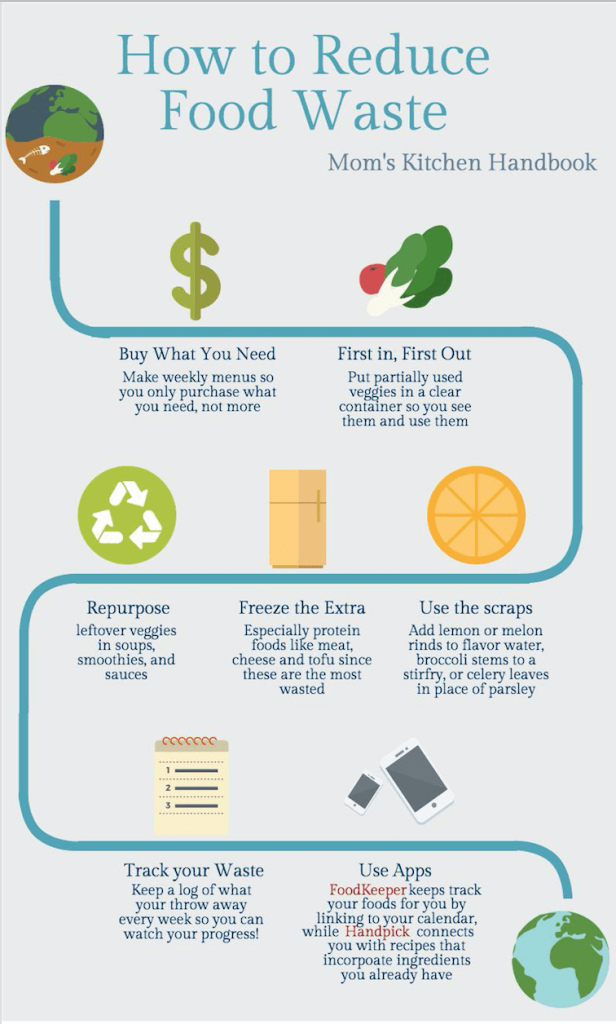
Get Creative with Leftovers
Make Stir-Fries or Fried Rice
Leftover vegetables, cooked meats, and rice can be transformed into delicious stir-fries or fried rice dishes. Heat some oil in a pan, add the leftovers, and stir-fry until heated through. Season with spices or sauces to add flavor and enjoy a new and exciting meal.
Turn Leftover Vegetables into Soups or Stews
Uneaten cooked vegetables can be used to make hearty soups or stews. Simply combine the vegetables with some broth and add seasonings to taste. Simmer until everything is heated through, and you have a nutritious and flavorful meal.
Transform Stale Bread into Croutons or Bread Pudding
Stale bread doesn’t have to go to waste. Transform it into croutons by baking with some olive oil and seasonings until crisp. Alternatively, use stale bread to make a delicious bread pudding, a comforting dessert that can be flavored with various additions like fruits or chocolate.
Blend Overripe Fruits into Smoothies or Sorbets
Overripe fruits are perfect for making refreshing smoothies or sorbets. Blend them with some yogurt or juice to create a smoothie packed with nutrients. Alternatively, freeze the fruit and blend it to create a guilt-free, all-natural sorbet.
Prepare Casseroles or Quiches with Leftover Meats and Vegetables
Leftover meats and vegetables can be transformed into delicious casseroles or quiches. Combine everything with some eggs, cheese, and seasoning, and then bake until set. This allows you to create a whole new meal that’s both tasty and utilizes your leftovers.
Preserve and Preserve
Home Can and Preserve Foods
Preserving foods through canning is a fantastic way to prevent them from going to waste. Foods like fruits, vegetables, and jams can be canned and stored for extended periods. With some basic equipment and knowledge of the canning process, you can enjoy your home-preserved goods all year round.
Make Jams, Pickles, or Chutneys
If you have excess fruits or vegetables, consider making homemade jams, pickles, or chutneys. These preserve the flavors and extend the shelf life of the produce. They’re great as condiments, snacks, or additions to various dishes.
Use Vacuum Sealers for Longer Shelf Life
Investing in a vacuum sealer can significantly extend the shelf life of certain foods. By removing the air from the packaging, vacuum-sealed items stay fresher for longer. This is particularly useful for meats, cheese, and other perishable items.
Dehydrate Fruits and Vegetables
Dehydrating fruits and vegetables is an excellent way to preserve them. Simply slice the produce and dry it out using a food dehydrator or an oven set to a low temperature. Dehydrated fruits and vegetables can be enjoyed as snacks or used in baking and cooking.
Use Fermentation Techniques
Fermentation is an age-old preservation technique that adds unique flavors and health benefits to foods. Fermenting vegetables, like sauerkraut or pickles, allows you to extend their shelf life while adding tangy and probiotic-rich elements to your diet.
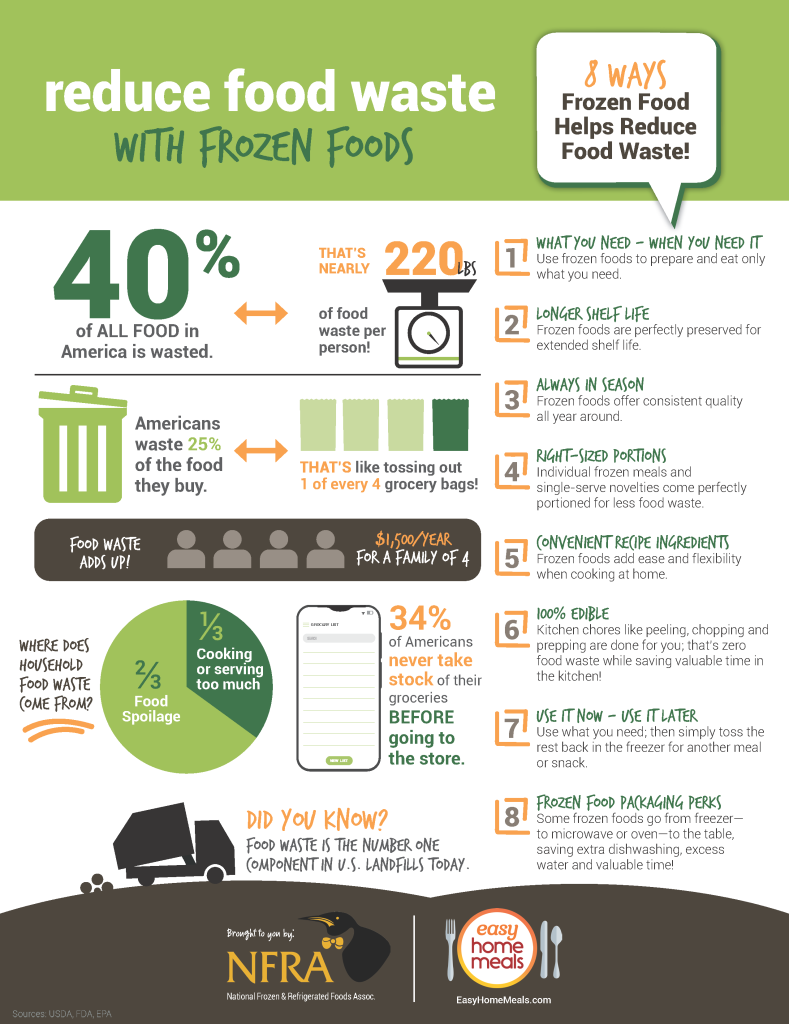
Compost Kitchen Scraps
Set Up a Compost Bin or Pile
Composting is an eco-friendly way to reduce food waste and create nutrient-rich soil. Set up a compost bin or pile in your garden or balcony to conveniently collect kitchen scraps and organic waste.
Compost Fruit and Vegetable Peelings
Instead of throwing fruit and vegetable peelings in the trash, add them to your compost bin. These scraps make excellent compost material and contribute to the richness of the finished product.
Include Coffee Grounds, Tea Bags, and Egg Shells
Coffee grounds, tea bags, and egg shells can also be added to your compost. These items break down and add valuable nutrients to the soil, helping your garden thrive.
Avoid Composting Meat, Dairy, and Oily Foods
While many food scraps can be composted, it’s important to avoid composting meat, dairy, and oily foods. These items can attract pests and cause unpleasant odors in your compost pile.
Use Compost for Gardening or Potted Plants
Once your compost has fully decomposed, utilize it to enrich your garden soil or potted plants. The nutrient-rich compost feeds your plants and reduces the need for chemical fertilizers.
Donate Excess Food
Find Local Food Banks or Charitable Organizations
If you have excess food that you won’t be able to consume before it spoils, consider donating it to local food banks or charitable organizations. These organizations distribute food to those in need, ensuring your surplus doesn’t go to waste.
Check Expiry Dates and Quality before Donation
Before donating food items, it’s essential to check their expiry dates and quality. Only donate items that are in good condition and within their best-before dates to ensure the safety and well-being of the recipients.
Ensure Proper Food Handling and Storage
When donating food, it’s crucial to handle and store it properly to maintain its quality and safety. Follow food safety guidelines to ensure the donated items are in their best condition and safe for consumption.
Donate Unopened Non-Perishable Items
Unopened non-perishable items, such as canned goods or packaged dry foods, are often in high demand at food banks. These items have a longer shelf life and can provide nourishing meals for those in need.
Consult Local Regulations on Food Donations
Before donating food, be sure to consult local regulations and guidelines regarding food donations. Different areas may have specific requirements and restrictions to ensure the safety and quality of donated food.
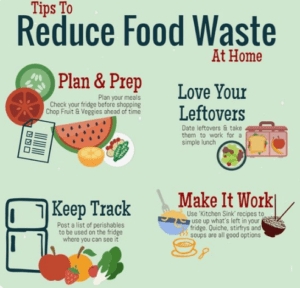
Educate Yourself and Others
Learn about Food Storage and Shelf Life
By educating yourself about food storage and shelf life, you become better equipped to reduce waste in your kitchen. Understand the proper storage conditions for different types of food and educate yourself on the best practices for extending shelf life.
Stay Updated on Food Safety Guidelines
Keeping up with food safety guidelines is crucial for maintaining the freshness and safety of your food. Stay updated on best practices for storing, handling, and preparing food to minimize the risk of contamination or spoilage.
Share Knowledge with Family and Friends
Spread the knowledge and encourage others to reduce food waste. Share tips and strategies with your family and friends, and encourage them to adopt more mindful practices in their own kitchens. Together, you can make a significant impact.
Teach Children about Reducing Food Waste
Instilling good habits in children from a young age can help create a future generation that is mindful of food waste. Teach children about the importance of using leftovers, proper portion sizes, and the benefits of composting. By involving them in the process, they can understand the impact they can have on reducing waste.
Support Local Community Initiatives
Get involved in local community initiatives that promote reducing food waste. These initiatives often offer educational programs, workshops, and resources to help individuals and households become more sustainable. By supporting these initiatives, you can contribute to the broader effort of reducing food waste in your community.
Be Mindful of Leftovers When Eating Out
Order Smaller Portions if Possible
When eating out, consider ordering smaller portions if available. Many restaurants offer various portion sizes or even half portions. Opting for smaller servings reduces the chances of having excessive leftovers.
Take Home Uneaten Food
If you have leftovers from a restaurant meal, don’t be afraid to ask for a to-go box. Taking home uneaten food allows you to enjoy it as another meal later, preventing waste and getting the most out of your dining experience.
Ask for a Doggy Bag
Similar to taking home uneaten food, asking for a doggy bag is a great way to ensure leftovers don’t go to waste. In some restaurants, portions can be quite generous, so having the option to take the remaining food home is a win-win.
Avoid Wasting Condiments or Single-Use Packaging
When dining out, be mindful of condiments or single-use packaging. Take only what you need and avoid wasting these resources. If you have leftovers, consider taking them home for future use.
Choose Restaurants with Sustainable Practices
Support restaurants that have sustainable practices in place. Look for establishments that focus on minimizing food waste, source ingredients responsibly, and implement eco-friendly measures. By patronizing these restaurants, you contribute to a more sustainable food industry.
